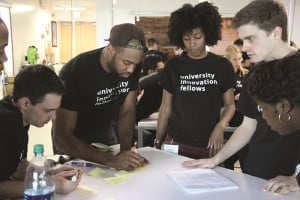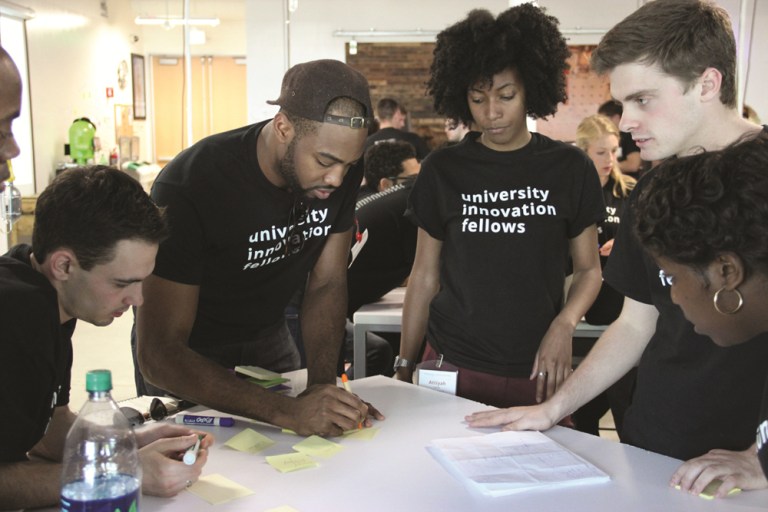From Mar. 20 to Mar. 22, 88 students from colleges across the country visited Stanford and Silicon Valley through the National Center of Engineering Pathways to Innovation (Epicenter)’s University Innovation Fellows program to learn about entrepreneurship and innovation through hands-on designing, listening to speakers and even dancing.

Goals of the program
Funded by the National Science Foundation, Epicenter is directed by Stanford University and the National Collegiate Inventors and Innovators Alliance (NCIIA). The Epicenter promotes innovation in undergraduate education, and its University Innovation Fellows program aims to train students to “become leaders who catalyze change” at their schools.
“We believe very strongly that engineers cannot graduate with just excellent technical skills,” said Leticia Britos Cavagnaro Ph.D. ’11, deputy director of Epicenter. “They also need to graduate with skills to identify and create opportunities.”
“Specifically, we feel students are key players to shaping their own educations,” she added. “They are change agents to shaping not only their education but [also] the University.”
Britos Cavagnaro explained that the program began on a much smaller scale in an effort by the NCIIA four years ago.
“We worked together and revamped it completely. We changed the philosophy,” Britos Cavagnaro said. “Now we are tasking the students to be more strategic thinkers. They are to analyze their schools’ landscapes and what changes they want to make in their own school.”
Fellows are selected through an application process and must be sponsored by a faculty member. Each year, the Epicenter supports two cohorts of fellows: one in the spring and one in the fall. Following acceptance into the program, students must complete six weeks of online training using the massive open online course platform NovoEd.
“Each week there is an assignment… For example they have to [perform] landscape analysis of their campus, talk with a past fellow or [have] a set of calls with a training coordinator,” Britos Cavagnaro said. “After training they are off to implementing their plan at their campus. We have monthly status calls and sharing.”
Scaling the program
Since its inception in Aug. 2012, the program has seen significant growth.
“We started with 10 [fellows] the first semester, and last semester we doubled to 20,” said Humera Fasihuddin, senior program officer for the University Innovation Fellows. “This semester we accepted 74 students.”
According to Fasihuddin, the fellows who have participated in the program have generally proven successful. Their efforts have included TEDx events, design teams and new innovation spaces.
“Faculty embrace the programs,” Fasihuddin said. “For example, we have 70 students shadowing physicians. That resulted in four patents in biomedical engineering…We’ve seen students being able to make substantial differences.”
Fasihuddin also explained that the program is piloting leadership circles for groups of four or five fellows from the same school to go through training together and have a more rapid impact on their universities.
In future years, Epicenter hopes to continue expanding the program to even more colleges, with an objective of reaching 200 engineering schools in the U.S. by 2016.
“[At that point] Epicenter would reach a tipping point in the engineering field,” Fasihuddin said.
Student takeaways
Both new and old fellows spoke about how they benefited by coming together and exchanging ideas over the course of four days.
Jared Karp, a UC-Berkeley senior studying mechanical engineering, shared his story of creating the Design Engineering Collaborative on campus, as well as receiving $20 million in funding to build a design institute at Berkeley.
“My favorite part of this is the students. It is so clear that this is a profound collection of leaders who can accomplish anything,” Karp said. “In our everyday lives, there are a lot of people who are not doers. In our everyday lives, we have to navigate whatever ecosystem we are in. But here anything is possible.”
“It is so electrifying and refreshing and exciting to be around each other,” he added. “I have never been a part of something like this. Students are the drivers of real change.”
Natalia von Windheim, a sophomore at North Carolina State University and a University Innovation Fellow candidate this spring, explained that the event allowed her to find new ways to innovate beyond participating in existing entrepreneurship efforts on her campus.
Ben Riddle, a current candidate who attends Furman University, has worked to create new courses at his school and to promote the presence of design thinking in social entrepreneurship on his campus.
“You think you’re alone until you meet everybody else and realize that there’s tons of us out there shifting the culture of institutions from the inside out,” Riddle said. “I think it’s a huge opportunity.”
Fasihuddin explained that they plan to hold a similar conference every year to continue bringing together a growing number of fellows.
“The time is now for these students to transform,” Fasihuddin said. “Every individual can be a leader. We can’t change where we came from, but everyone can make their own impact.”
Contact Kylie Jue at kyliej ‘at’ stanford ‘dot’ edu.
